| Srl | Item |
| 1 |
ID:
138282
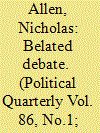

|
|
|
|
|
| Summary/Abstract |
The three televised leaders’ debates dominated the 2010 general election campaign. The House of Lords Communications Committee report on Broadcast General Election Debates is the product of a welcome but belated public inquiry into their organisation and conduct. The report is supportive of the view that ‘broadcast general election debates should take place during future campaigns’ and makes a number of cautious recommendations to the broadcasters. At the time of writing it was unclear whether the format proposed by the broadcasters for 2015 would be an improvement on that for 2010—or even if there would be any debates at all.
|
|
|
|
|
|
|
|
|
|
|
|
|
|
|
|
| 2 |
ID:
161658
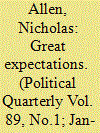

|
|
|
|
|
| Summary/Abstract |
Anthony King thought and wrote a great deal about British prime ministers and political leadership more generally. But in contrast to the way in which single papers embodied his contribution to our understanding of ‘government overload’, ‘executive‐legislative relations’ and ‘career politicians’, his contribution to our understanding of the prime ministership was defined by a body of work. This essay explores that body of work and identifies some of the themes that characterised it. It then relates King's work to claims about the ‘presidentialisation’ of the office, as well as the importance of the expectations surrounding contemporary prime ministers. As Britain grapples with the challenge of Brexit, we should all take note of his counsel against expecting too much in the way of ‘strong’ prime ministerial leadership.
|
|
|
|
|
|
|
|
|
|
|
|
|
|
|
|
| 3 |
ID:
095288
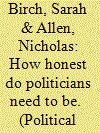

|
|
|
|
|
| Publication |
2010.
|
| Summary/Abstract |
This article reports findings from a recent survey of citizens' attitudes towards standards in British public life. It provides further evidence that people hold their political leaders to high standards, yet are often disappointed by the reality, and suggests that many citizens tend to blame the practice and institutions of politics for making politicians less honest and trustworthy than they would ideally like. The article argues that reforms to the political system are needed to regain the confidence of the population, but that the manner in which the most recent round of ethics reforms in the House of Commons were introduced may lower the prospects of their achieving this goal.
|
|
|
|
|
|
|
|
|
|
|
|
|
|
|
|
| 4 |
ID:
165566
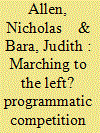

|
|
|
|
|
| Summary/Abstract |
This article analyses the content of the 2017 general election manifestos, and introduces the latest estimates from the Manifesto Project to explore recent ideological movements in the British party system. It reports the changing policy emphases in Conservative and Labour manifestos and the ideological positions of the major political parties in 2017. It finds that Theresa May's party produced its most left‐wing manifesto since 1964, and that Jeremy Corbyn's party produced its most left‐wing manifesto since 1992 and the election before the advent of New Labour. The article also finds that the ideological space between the Conservatives and Labour opened up in 2017, and that Northern Ireland's Democratic Unionists published the most right‐wing manifesto.
|
|
|
|
|
|
|
|
|
|
|
|
|
|
|
|
| 5 |
ID:
111501
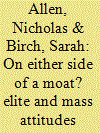

|
|
|
|
|
| Publication |
2012.
|
| Summary/Abstract |
This article develops a cognitive institutionalist account of mass and elite evaluations of political ethics, which is tested on a new dataset from the United Kingdom. The analysis explores the extent of contemporary disagreement among British political elites and those they represent by comparing responses to questions asked in a representative survey of the public with similar questions asked of incumbent MPs and parliamentary candidates. There are systematic differences between members of the public, candidates and MPs at both aggregate and individual levels - differences which can be accounted for with reference to the framing effects of Parliament as an institution. Candidates for parliamentary office display significantly more tolerance of ethically dubious behaviour than other members of the public. Within the elite category, elected MPs exhibit more permissive ethical standards than those candidates who are unsuccessful.
|
|
|
|
|
|
|
|
|
|
|
|
|
|
|
|
| 6 |
ID:
111655
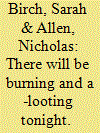

|
|
|
|
|
| Publication |
2012.
|
| Summary/Abstract |
In the aftermath of the August 2011 riots, politicians and commentators offered a range of explanations for the social unrest and wanton violence. Drawing on survey and focus-group data, this paper investigates those explanations by analysing how socio-economic, normative and political factors shape contemporary attitudes towards law breaking in Britain. The paper finds that both economic deprivation and personal moral values help to explain attitudes toward illegal behaviour, but citizens' mistrust of political leaders and their disengagement from public affairs are also an important factor. The findings suggest that politicians who want to provide moral leadership need to do so through their actions as well as their words.
|
|
|
|
|
|
|
|
|
|
|
|
|
|
|
|